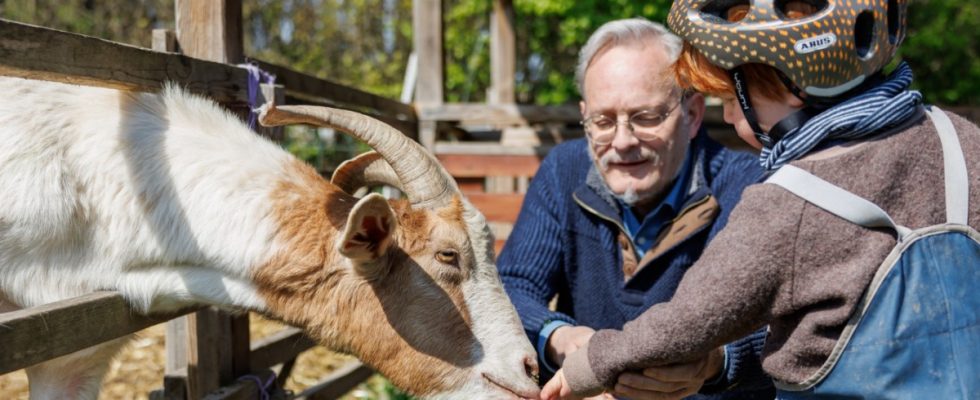A group of children is cooking potato soup outside with wild herbs they have collected themselves. Other children have built a shop and sell dandelion flowers to eat. Two four-year-olds feed the goats. “We’ve run out of food, we need grass,” says four-year-old Levi. The farm kindergarten in Giebelstadt (district of Würzburg) in Lower Franconia is one of the relatively few farm day-care centers nationwide. Similar to forest kindergartens, the children spend most of their time outdoors.
A teacher tinkers a leaf press. Her dog Hazel is lying in the grass next to her. Other children play in the sandbox, paint, climb or ride a balance bike and toy tractor. The educators have walkie-talkies with them so that they can communicate with each other on the 5000 square meter site. Each child has a square meter of field that they tend with support. They also go on a trip to the forest every week and pass other fields.
“The children observe weekly throughout the year how the seed grows,” says farmer Ulrich Pabst, who initiated and runs the kindergarten together with his wife. The farmer says that even five-year-olds know where the food comes from and that it takes work. “By working with chickens and goats on a daily basis, the children have an idea of animal welfare,” says Pabst.
His family has been farming for 500 years, in organic quality for eight years. Wife Inge Moser-Pabst is a trained teacher. The couple gradually came up with the idea of a daycare center with goats, chickens and fields. When their own children started school, the couple started their first school campaigns. “Squeezing apples into juice, planting potatoes, simple things like that,” says the 63-year-old. The farm kindergarten finally welcomed the first children in 2018. The local kindergarten had previously been so overcrowded that another emergency group was to be opened in the basement. The daycare started with six children. Now it can be up to 28. The minimum age is two and a half years.
The head of the farm kindergarten in Giebelstadt, Elke Kleid, is preparing the soup for lunch outdoors with two children.
(Photo: Daniel Karmann/dpa)
The childcare ratio is much better than in most kindergartens: there are usually four teachers, so there are about six children for each teacher. “It’s the nicest job I’ve ever had,” says daycare manager Elke Kleid. The 56-year-old used to work as a nurse and developed allergies in the process. Now, together with the children, she is in the fresh air every day. “Nature is a very good educator,” saysClothes. The children naturally experienced consequences: the animals run away if the children treat them too roughly. Gloves get wet if a child leaves them outside and it’s raining.
Dresses is of the opinion that children in farm and forest day-care centers play differently than in regular kindergartens. more creative. Tatia Michel experienced the same thing. She is the mother of three and a half year old Elias, who has been attending the farm kindergarten since September. Before that he was in a daycare center. “When I pick Elias up, he’s always relaxed and still has a lot of energy in the afternoon,” says the mother. In the past, he was often rather irritable after daycare and wanted his peace and quiet. Even in winter, Elias’ daycare center was fun. “The fear that it might be too cold and uncomfortable was more my own,” says Michel, who is a special education teacher herself.
According to the Federal Working Group on Farm Learning (BAGLoB), based in Berlin, there are now around 80 farm daycare centers nationwide. Most of them in Bavaria, Baden-Württemberg, North Rhine-Westphalia and Schleswig-Holstein. Farm crèches for children under the age of three also existed in isolated cases. According to BAGLoB, the first farm daycare center in Germany opened in Schleswig-Holstein about 20 years ago.
Inge Moser-Pabst, teacher and co-initiator of the Giebelstadt farm kindergarten, takes part in the game with Thea, Elia and Marie at a shop.
(Photo: Daniel Karmann/dpa)
Not all farm daycare centers are the same. Only some are on an actively managed farm. Others are only settled near a farm or make regular farm trips. Some are also located on former farms. Day-care centers can be extra income for farmers. However, often a complex one. According to BAGLoB, farmers primarily benefit financially from leasing. However, the concept also allows some farmers to keep animal species that are no longer worthwhile from a purely agricultural point of view. “This can make agriculture in small structures possible again,” says BAGLoB spokeswoman Annette Müller-Clemm.
While forest day-care centers are now widespread, the word “farm kindergarten” apparently still raises question marks. “Farms that want to install daycare centers are still pioneers,” says Müller-Clemm. Authorities in particular are often overwhelmed with the term, which is still new to them. “It helps to point out farm day-care centers that already exist,” says Müller-Clemm.
Ulrich Pabst and his wife also experienced skepticism at first from authorities such as the health and youth welfare office. The authorities would have forbidden a play barn for bad weather due to safety concerns. Therefore, the couple organized construction trailers like in forest daycare centers instead. “The authorities already knew that and waved it through,” says Pabst. The farmer is very grateful to the forest day-care centers. “They did a lot of pioneering work in nature education and paved the way for us from the authorities,” says the farm kindergarten teacher.

